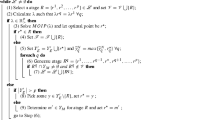Abstract
We investigate the problem of finding the nadir point for multiobjective discrete optimization problems (MODO). The nadir point is constructed from the worst objective values over the efficient set of a multiobjective optimization problem. We present a new algorithm to compute nadir values for MODO with \(p\) objective functions. The proposed algorithm is based on an exhaustive search of the \((p-2)\)-dimensional space for each component of the nadir point. We compare our algorithm with two earlier studies from the literature. We give numerical results for all algorithms on multiobjective knapsack, assignment and integer linear programming problems. Our algorithm is able to obtain the nadir point for relatively large problem instances with up to five-objectives.



Similar content being viewed by others
Notes
\(\mathcal {Y}_P^k\) represents the list of nondominated solutions until \(y_k^N\) is obtained. At termination, \(\mathcal {Y}_P^k\) may not include all nondominated solutions, i.e. \(\mathcal {Y}_P^k \subseteq \mathcal {Y}_{ND}\) for each \(k \in \{1,\ldots ,p\}\).
References
Abbas, M., Chaabane, D.: Optimizing a linear function over an integer efficient set. Eur. J. Oper. Res. 174(2), 1140–1161 (2006)
Alves, M.J., Costa, J.P.: An exact method for computing the nadir values in multiple objective linear programming. Eur. J. Oper. Res. 198(2), 637–646 (2009)
An, L.T.H., Tao, P.D., Muu, L.D.: Numerical solution for optimization over the efficient set by dc optimization algorithms. Oper. Res. Lett. 19(3), 117–128 (1996)
Ben-Tal, A.: Characterization of pareto and lexicographic optimal solutions. In: Fandel, G., Gal, T. (eds.) Multiple Criteria Decision Making Theory and Application. Lecture Notes in Economics and Mathematical Systems, vol. 177, pp. 1–11. Springer, Berlin (1980)
Benson, H.P.: Optimization over the efficient set. J. Math. Anal. Appl. 98(2), 562–580 (1984)
Benson, H.P.: An all-linear programming relaxation algorithm for optimizing over the efficient set. J. Glob. Optim. 1(1), 83–104 (1991)
Benson, H.P.: A finite, nonadjacent extreme-point search algorithm for optimization over the efficient set. J. Optim. Theory Appl. 73(1), 47–64 (1992)
Benson, H.P.: A bisection-extreme point search algorithm for optimizing over the efficient set in the linear dependence case. J. Glob. Optim. 3(1), 95–111 (1993)
Benson, H.P., Lee, D., McClure, J.P.: Global optimization in practice: an application to interactive multiple objective linear programming. J. Glob. Optim. 12(4), 353–372 (1998)
Bolintineanu, S.: Minimization of a quasi-concave function over an efficient set. Math. Program. 61(1), 89–110 (1993)
Bonnel, H., Kaya, C.Y.: Optimization over the efficient set of multi-objective convex optimal control problems. J. Optim. Theory Appl. 147(1), 93–112 (2010)
Cplex: IBM ILOG Cplex Optimization Studio 12.4 (2012)
Dauer, J.P.: Optimization over the efficient set using an active constraint approach. Math. Methods Oper. Res. 35(3), 185–195 (1991)
Dauer, J.P., Fosnaugh, T.A.: Optimization over the efficient set. J. Glob. Optim. 7(3), 261–277 (1995)
Ecker, J.G., Song, J.H.: Optimizing a linear function over an efficient set. J. Optim. Theory Appl. 83(3), 541–563 (1994)
Ehrgott, M.: Multicriteria Optimization. Springer, Berlin (2005)
Ehrgott, M., Tenfelde-Podehl, D.: Computation of ideal and nadir values and implications for their use in MCDM methods. Eur. J. Oper. Res. 151(1), 119–139 (2003)
Granat, J., Guerriero, F.: The interactive analysis of the multicriteria shortest path problem by the reference point method. Eur. J. Oper. Res. 151(1), 103–118 (2003)
Haimes, Y.Y., Lasdon, L.S., Wismer, D.A.: On a bicriterion formulation of the problems of integrated system identification and system optimization. IEEE Trans. Syst. Man Cybern. 1(3), 296–297 (1971)
Horst, R., Tuy, H.: Global Optimization: Deterministic Approaches. Springer, New York (1995)
Isermann, H., Steuer, R.E.: Computational experience concerning payoff tables and minimum criterion values over the efficient set. Eur. J. Oper. Res. 33(1), 91–97 (1988)
Jorge, J.M.: An algorithm for optimizing a linear function over an integer efficient set. Eur. J. Oper. Res. 195(1), 98–103 (2009)
Kirlik, G., Sayın, S.: A new algorithm for generating all nondominated solutions of multiobjective discrete optimization problems. Eur. J. Oper. Res. 232(3), 479–488 (2014)
Köksalan, M.M., Sagala, P.N.S.: Interactive approaches for discrete alternative multiple criteria decision making with monotone utility functions. Manag. Sci. 41(7), 1158–1171 (1995)
Laumanns, M., Thiele, L., Zitzler, E.: An efficient, adaptive parameter variation scheme for metaheuristics based on the epsilon-constraint method. Eur. J. Oper. Res. 169(3), 932–942 (2006)
Le Thi Hoai, A., Tao, P.D.: Solving a class of linearly constrained indefinite quadratic problems by DC algorithms. J. Glob. Optim. 11(3), 253–285 (1997)
Miettinen, K., Eskelinen, P., Ruiz, F., Luque, M.: NAUTILUS method: an interactive technique in multiobjective optimization based on the nadir point. Eur. J. Oper. Res. 206(2), 426–434 (2010)
Özlen, M., Azizoğlu, M.: Multi-objective integer programming: a general approach for generating all non-dominated solutions. Eur. J. Oper. Res. 199(1), 25–35 (2009)
Reeves, G.R., Reid, R.C.: Minimum values over the efficient set in multiple objective decision making. Eur. J. Oper. Res. 36(3), 334–338 (1988)
Sayın, S.: Optimizing over the efficient set using a top-down search of faces. Oper. Res. 48(1), 65–72 (2000)
Yamamoto, Y.: Optimization over the efficient set: overview. J. Glob. Optim. 22(1), 285–317 (2002)
Acknowledgments
This work is supported by TUBITAK (Scientific & Technical Research Council of Turkey), Project No. 112M217. We thank anonymous reviewers whose comments improved the presentation of the paper.
Author information
Authors and Affiliations
Corresponding author
Rights and permissions
About this article
Cite this article
Kirlik, G., Sayın, S. Computing the nadir point for multiobjective discrete optimization problems. J Glob Optim 62, 79–99 (2015). https://doi.org/10.1007/s10898-014-0227-6
Received:
Accepted:
Published:
Issue Date:
DOI: https://doi.org/10.1007/s10898-014-0227-6




